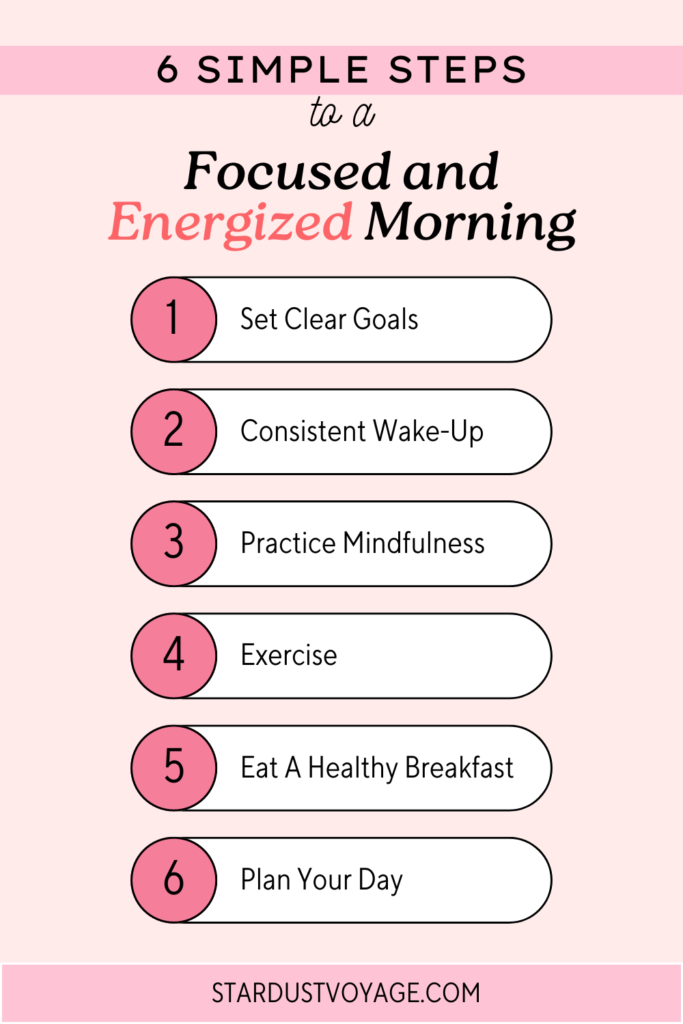It’s time to take charge of your day and set the tone for success with a powerful morning routine designed to cultivate mental clarity. By harnessing the power of intentional practices like mindfulness, exercise, and goal setting, you can supercharge your focus, productivity, and overall well-being. Join me on this journey towards a more purposeful and energized start to your day!

Step 1: Identifying Your Goals and Priorities
Reflecting on Your Values and Objectives
Your morning routine should be aligned with your values and objectives to set the tone for the rest of your day. Take a moment to reflect on what matters most to you. What are your long-term goals? What do you want to achieve in the next month, year, or even five years? By understanding your values and objectives, you can tailor your morning routine to support them.
Assessing Your Current Morning Habits
On a practical level, it’s important to evaluate your current morning habits. What are you currently doing when you wake up? Are these habits helping you or hindering you from reaching your goals? Assessing your current morning habits allows you to identify areas for improvement and make adjustments for a more productive and fulfilling start to your day.
This self-assessment is crucial for creating a morning routine that will enhance your mental clarity and overall well-being. By being honest with yourself and willing to make changes, you can design a morning routine that sets you up for success.
Step 2: Building a Foundation for Mental Clarity
Establishing a Consistent Wake-Up Time
Some of the most successful people attribute their mental clarity to starting their day at the same time every morning. By establishing a consistent wake-up time, you set the tone for your day and train your body to operate efficiently. When I wake up at the same time each day, I find that I feel more alert and focused, ready to tackle whatever challenges come my way.
Creating a Sleep-Conducive Environment
With a sleep-conducive environment, you can optimize the quality of your rest and set yourself up for mental clarity upon waking. Ensure your bedroom is cool, dark, and quiet to promote deep sleep. Dim the lights and limit screen time before bed to signal to your brain that it’s time to wind down. By creating a peaceful atmosphere, you can relax more easily and facilitate a restful night’s sleep.
To enhance your sleep-conducive environment, consider investing in a comfortable mattress and pillows that support your body’s natural alignment. This can alleviate any physical discomfort that may disrupt your sleep and help you wake up feeling refreshed and revitalized.
Developing a Bedtime Routine
One key to preparing your mind and body for restful sleep and mental clarity is developing a bedtime routine. By engaging in relaxing activities before bed, such as reading a book, practicing meditation, or taking a warm bath, you signal to your brain that it’s time to unwind and prepare for sleep. I find that following a consistent bedtime routine helps me transition from the busyness of the day to a state of calm and relaxation, setting the stage for a restorative night’s rest.
Clarity comes not only from how you start your day but also from how you end it. By establishing healthy sleep habits and a calming bedtime routine, you can lay a strong foundation for mental clarity and overall well-being.
Step 3: Morning Exercises for Mental Clarity
Not only does physical exercise help keep your body healthy, but it also plays a significant role in your mental well-being. By incorporating morning exercises into your routine, you can kickstart your day with mental clarity and focus. Here are some exercises that can aid in sharpening your mind:
Mental Clarity Through Meditation and Mindfulness Practices
Starting your day with a few moments of meditation or mindfulness can do wonders for your mental clarity. By taking the time to quiet your mind and focus on the present moment, you can reduce stress, improve concentration, and enhance your overall mental well-being. Incorporating deep breathing exercises along with meditation can further boost your cognitive function and help you approach the day with a calm and centered mindset.
With Journaling and Reflection Techniques
With journaling and reflection techniques, you can tap into your inner thoughts and emotions, paving the way for greater mental clarity. Taking a few minutes each morning to write down your thoughts, goals, or even worries can help declutter your mind and provide a sense of direction for the day ahead. Reflecting on past experiences and lessons learned can also contribute to your personal growth and mental well-being.
Journaling allows you to track your progress, identify patterns in your thoughts and behaviors, and unleash your creative potential. It serves as a tool for self-discovery and can help you gain a deeper understanding of yourself and your emotions.
Morning Physical Exercise for Mental Stimulation
Morning physical exercise is beneficial for your physical health and plays a crucial role in stimulating your mental faculties. Engaging in activities like yoga, jogging, or even a quick morning workout can increase blood flow to the brain, boost your mood, and enhance your cognitive function. Incorporating physical exercise into your morning routine can set a positive tone for the day and improve your mental clarity and focus.
This brings me to the importance of starting your day with movement. Physical exercise doesn’t just benefit your body – it also has a significant impact on your mental well-being. When you engage in physical activity in the morning, you energize your body and sharpen your mind, setting the stage for a productive day ahead.

Step 4: Nourishing Your Body and Mind
After setting the stage for a productive day with my morning routine, I focus on nourishing my body and mind with the right nutrients and hydration. Starting the day with a healthy breakfast can provide the energy and focus needed to tackle the tasks ahead.
Healthy Breakfast Options for Energy and Focus
For optimal mental clarity, consider incorporating protein-rich foods like eggs, Greek yogurt, or nut butter into your breakfast. Pair these with complex carbohydrates such as whole-grain toast or oats to sustain your energy levels throughout the morning. Including fruits and vegetables in your breakfast not only adds vitamins and minerals but also boosts your overall well-being.
Hydration and Nutrition Tips
Nourishing your body with water is vital for maintaining mental clarity and focus. Aim to drink at least 8-10 glasses of water throughout the day to stay hydrated and support optimal brain function. Additionally, incorporating foods high in omega-3 fatty acids, like salmon and chia seeds, can help improve cognitive function and mood.
- Choose whole foods over processed options for better nutrition.
- Include a variety of colors in your meals to ensure a diverse nutrient intake.
Nourishing your body with the right nutrients and staying hydrated can significantly impact your cognitive performance and overall well-being. Recognizing the connection between what you eat and how you feel can empower you to make healthier choices and fuel your body for success.
Avoiding Stimulants and Distractions
Hydration plays a significant role in mental clarity, as even mild dehydration can impair cognitive function. Ensuring that I stay hydrated throughout the day helps me maintain focus and productivity, allowing me to tackle tasks efficiently without feeling sluggish. Understanding the impact of stimulants like caffeine and distractions like excessive screen time is crucial for preserving mental clarity. By limiting caffeine intake and setting boundaries around screen usage, I create a conducive environment for deep focus and concentration. This mindful approach allows me to optimize my cognitive abilities and perform at my best throughout the day.
Step 5: Time Management and Productivity
Your ability to manage time effectively and boost productivity is necessary for mental clarity. By creating a solid morning routine, you can set the tone for a successful day. Prioritizing tasks and setting realistic goals is key to maximizing your productivity and avoiding overwhelm.
Prioritizing Tasks and Setting Realistic Goals
Realistic goal-setting involves breaking down your tasks into manageable steps and setting achievable deadlines. By prioritizing your tasks and focusing on the most important ones first, you can make significant progress toward your goals. This approach not only helps you stay organized but also reduces stress and enhances your sense of accomplishment.
Creating a Morning Schedule and Routine
Productivity is not just about getting things done, but also about getting the right things done efficiently. Creating a morning schedule and routine can help you start your day with intention and purpose. By incorporating activities like exercise, meditation, or reading into your morning routine, you can boost your energy levels and mental clarity for the day ahead.
The key is to identify the activities that best support your goals and well-being and to stick to a consistent schedule that works for you. This will help you establish a productive rhythm and make the most of your mornings.
Minimizing Digital Distractions
An overwhelming amount of digital distractions can hinder your focus and productivity. Minimizing these distractions is crucial for maintaining mental clarity and staying on track with your goals. By setting boundaries with technology, such as turning off notifications or designating specific times for checking emails and social media, you can regain control of your time and attention.
Taking regular breaks from screens and engaging in offline activities can also help refresh your mind and boost creativity. Prioritizing real-world interactions and activities can improve your overall well-being and prevent digital overload.
Step 6: Overcoming Obstacles and Staying Consistent
Anticipating and Addressing Common Challenges
Common challenges can arise when trying to establish a morning routine for mental clarity. Some obstacles you may face include fatigue, distractions, and the temptation to hit the snooze button. To combat these challenges, I recommend setting a consistent bedtime to ensure you get enough rest each night. Additionally, creating a designated space free from distractions can help you stay focused during your morning routine.
Building Accountability and Support Systems
Support from friends, family, or a mentor can significantly impact your ability to stay consistent with your morning routine. By sharing your goals with someone you trust, you hold yourself accountable and create a sense of responsibility to follow through. Consider joining a morning routine accountability group or finding a workout buddy who shares similar goals. This support system can provide encouragement and motivation when you need it most.
A morning routine journal can also be a useful tool to track your progress and reflect on your journey towards mental clarity. Writing down your wins and struggles each day can help you identify patterns and make adjustments as needed.
Celebrating Small Wins and Progress
Addressing and acknowledging the small wins you achieve along the way is crucial for staying motivated and maintaining consistency. Celebrating progress, no matter how small, can boost your confidence and strengthen your commitment to your morning routine. Whether it’s completing a meditation session without distractions or waking up at your intended time for a week straight, remember to celebrate these achievements as they add up to significant progress over time.
Wins don’t always have to be monumental; even the smallest steps forward deserve recognition. By acknowledging and celebrating these wins, you reinforce positive habits and reinforce your dedication to your morning routine for mental clarity.
Summing up
With this in mind, creating a morning routine for mental clarity is important for setting a positive tone for your day. By incorporating activities like meditation, exercise, journaling, and a healthy breakfast into your routine, you can promote mental well-being and productivity throughout the day. Recall, consistency is key, so make sure to stick to your routine and adjust it as needed to best suit your individual needs.








